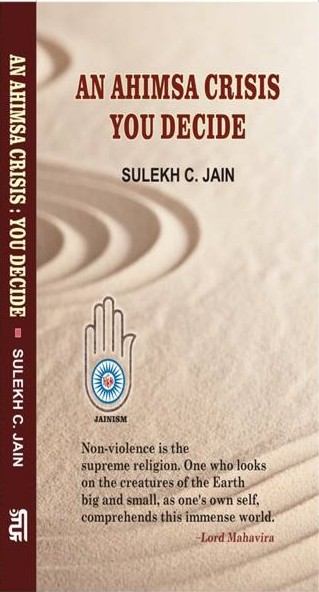Temple building - this is in full frenzy in India as well as in other places wherever Jains live. Every day elaborate panch- kalyanaks and other celebrations have become common; each costs large sums of money. As we plan and build larger and ever grander temples, the need for more money grows. The question is this: should Jains question the sources of that money? The real truth is that many times, they don’t. They want money and it is not generally the recipient’s business where that money came from. He is concerned only to raise funds. Here are a few examples:
- For a long time, in India, some Jains traded in opium, tobacco, and other similar commodities. The reason was simple. Such commodities provided huge profits and thus very quickly they became quite rich. Many of these traders, in their minds, consistently separated their life style and religious practices from their ways of earning money. To them, the two were not the same. Now: what to do with those huge sums of money? Of course, only temple building would buy them name, fame and likely a reserved place in heaven. So, most probably, some of the temples in India (I don’t know how many but I do suspect) might have been built with such kinds of funds. In one specific case, I did read a mention of this in a Jain magazine by a granddaughter whose grandparents had built a magnificent temple with money earned from the opium trade.
- Quite often, I have seen advertisements in Jain magazines for products such as leather, silk, wool, pearls, alcohol and non-veg Indian food restaurants. I wonder why no one stops to question these advertisements? In my opinion, such advertisements in Jain magazines, promote those products and choices.
About fifteen years ago, one famous Jain singer was planning to visit Houston. So, we arranged for a big public performance by him. We also planned to print a special souvenir on this occasion. To raise enough funds for this souvenir, I asked one of my colleagues, with good business connections, to secure some advertisements from Indian businesses, which she did. While going through all the advertisements, I turned down one advertisement from a non-veg Indian restaurant in town. First, there was some concern within the souvenir committee why I had done this. I did explain my reasons for not condoning the meat-related products but some of them felt that I was crazy and fanatic.
After the performance, the same restaurant invited this visiting Jain singer, as well as some of us from the Jain community, to a luncheon reception in the singer’s honor. We gladly accepted this gesture and enjoyed a delicious lunch.
After the lunch, when a few of us went to the owner to thank him, he softly asked, “How could you turn down my advertisement in the souvenir campaign, yet you gladly accepted this luncheon reception?” Right way, we realized our grave mistake. I really felt ashamed and thanked the owner for teaching me this practical lesson about money and its origin.
One distant relative of mine has made some good money by owning several liquor and convenience stores where meat is also freely sold. He and his family are strict vegetarians and regularly observe many Jain rituals including long fasts. A few years ago, this person went to India and wanted to donate some funds to a Jain temple, which was under construction. The administration of the temple knew about the sources of the funds. They flatly rejected the offer, as they did not want to spoil the sanctity of their temple with his donation. What an example! I hope and await more such examples.
- About a year ago, one very concerned Jain in USA sent out a mass email soliciting opinions about the sources of funds and their donations to charitable and religious Jain causes. He and I both, were surprised that very over-whelming majority of Jains responded that who are we to question the sources of funds? It is none of our business and we should gladly accept them. It is for the donor to worry about his karma and not the donee even though the donee is fully aware of the sources.
In Jainism, “ahimsa” is becoming a slogan just like the name, idea and the image of “Mahatma Gandhi” becomes a slogan for politicians in India during election times.
In May 2011, I had a chat with a prominent Jain in North America who mentioned that he had just come back from India after attending the installation and full panch-kalyanaks of two large Jain pratimas, in two different Jain temples. One of his close relatives had donated these pratimas. My friend was praising him for this great punya karma.
During the chat, I just asked my friend about the business of the donor. His answer was that he owns and runs a large silk mill in India. I was shocked. One makes a living and amasses wealth (parigraha) by running a slaughter house (for three-sensed silk insects) by killing millions of live, three- sensed silk worms daily, and from that slaughterhouse loot, he funds two Jain pratimas. What more can be said. This is what we are evolving into. I wonder how many Jain temples have been or are being built and various rituals done with wealth earned through himsatmak means. I suppose the way we talk and walk are now two entirely different things.
I have heard, but don’t have a proof, that even outside India, a few of the major donations for the building of expensive Jain temples are not free from such dubious money either.
I wonder when the Jain community will start reflecting on the source and refusing such donations (in any shape or form, may it even be in the disguise of ghee bolis) for Jain causes such as for temples, jiv Daya, Panch-kalyanaks, teertha yatras, seminars, or conventions. If we do not refuse, and if we do not care about the means by which the money has been earned, then we Jain sanghs are not only condoning such acts and behavior, but are also losing any influence we might exercise as a community on the behavior of such donors.
Mahatma Gandhi always reminded us that means and ends of actions should be in harmony and ends should never justify any means. He said, “If we want to cross the ocean, we cannot do so by a bullock cart. We must use a boat or a ship.”
There is no such thing as, “All is fair and acceptable when it comes to accepting donations.”
Now you decide: is this behavior consistent with ahimsa?
 Dr. Sulekh Chand Jain
Dr. Sulekh Chand Jain
